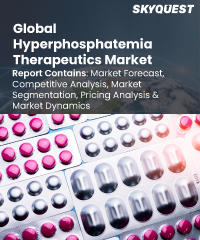
Report ID: SQSG35I2014

Report ID:
SQSG35I2014 |
Region:
Global |
Published Date: April, 2024
Pages:
157
|
Tables:
66 |
Figures:
75
Our industry expert will work with you to provide you with customized data in a short amount of time.
REQUEST FREE CUSTOMIZATIONHyperphosphatemia Therapeutics Market size was valued at USD 3.1 billion in 2019 and is poised to grow from USD 3.3 billion in 2023 to USD 4.2 billion by 2031, growing at a CAGR of 6.5% in the forecast period (2024-2031).
Want to customize this report? This report can be personalized according to your needs. Our analysts and industry experts will work directly with you to understand your requirements and provide you with customized data in a short amount of time. We offer $1000 worth of FREE customization at the time of purchase.

Report ID: SQSG35I2014